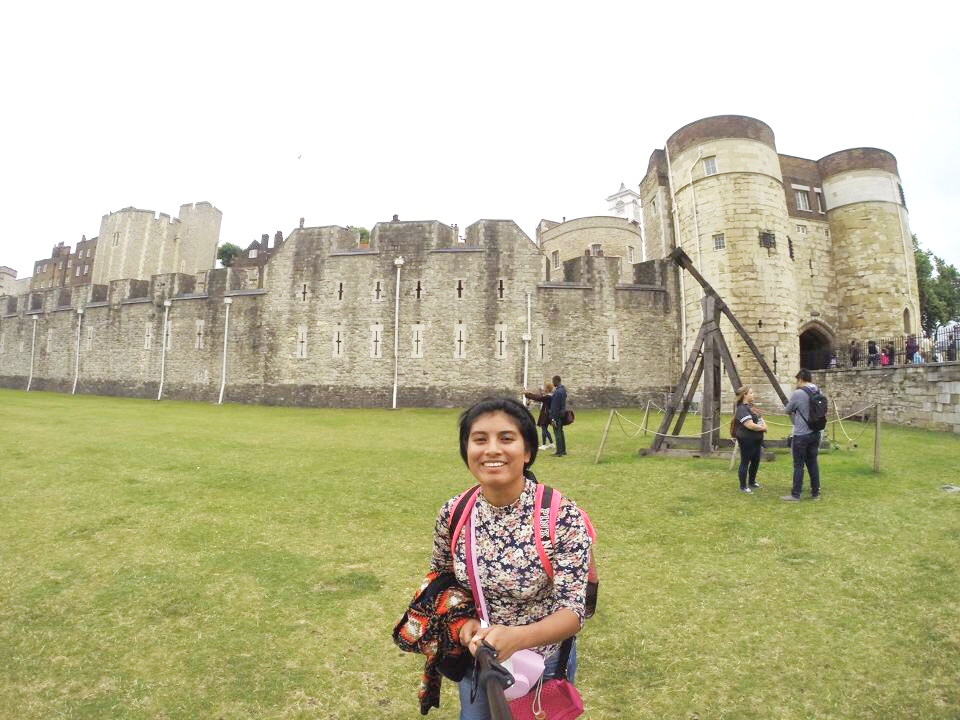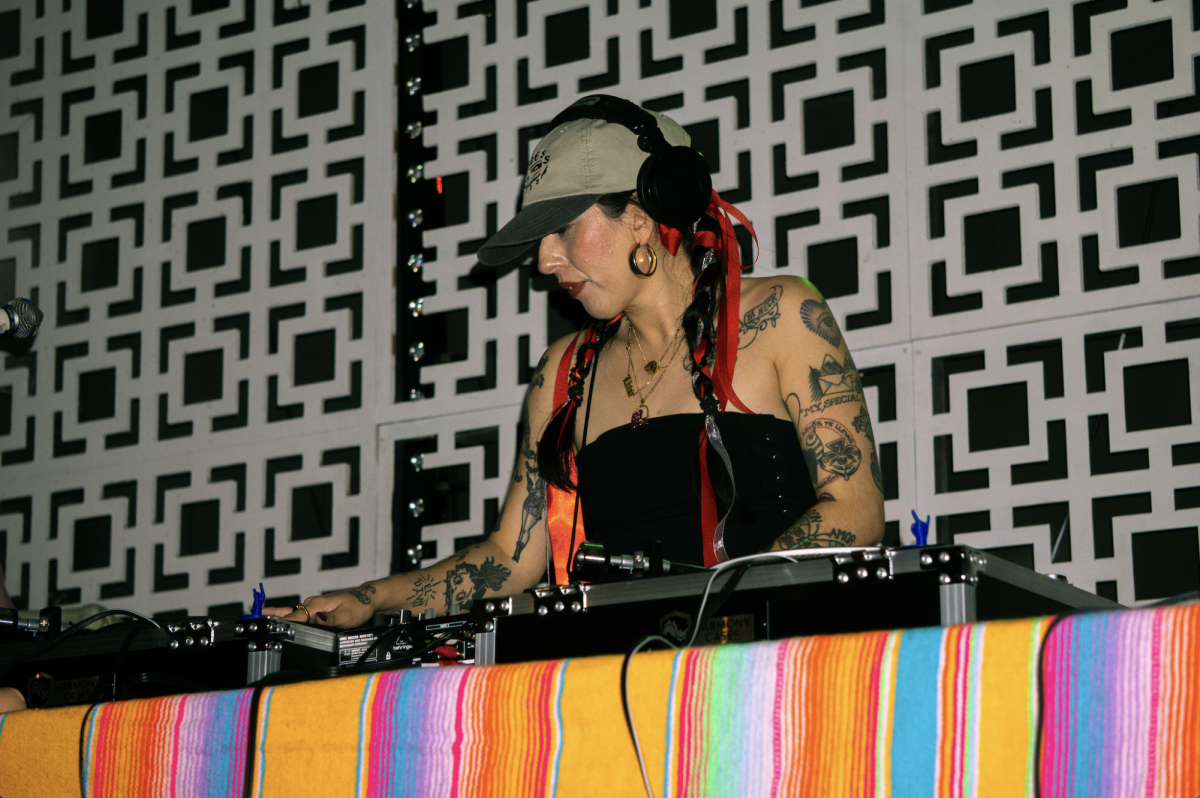It was four in the morning and Mayra Kahori Vidaña Sanchez was wide awake in front of a dim computer screen at her parent’s home in Juarez, Mexico, scrambling to complete her objective for the night.
Days before the application was due, she was scrambling to finish her video portion of the Frederick Douglass Global Fellowship, a program for minority students across the nation, where they take students abroad and develop their learning skills and their multicultural communication abilities.
She was tasked to comprise a video detailing her life, an essay and a letter of recommendation from UTEP President Diana Natalicio, all in one week with no feedback from any of her mentors, something she had never done when applying for a job, position or internship.
Vidaña Sanchez, a junior education major, was able to get a last-minute letter of recommendation from President Natalicio earlier that week and credits it to being a Miner Ambassador, a mentoring program at UTEP.
But, to make matters more stressful, as she was uploading her finished video, all her work erased from her computer. It was now five in the morning.
With tears streaming down her face, Vidaña Sanchez felt an overwhelming sense of defeat.
However, her father, who had been woken up by her typing and clicking, offered his assistance and was able to recover the video. Without hesitation and a silent prayer, she turned in the video and got ready to cross the border for school.
She had not slept at all that night, but what mattered for Vidaña Sanchez is that she completed the application that had troubled her so greatly.
All she could do now was wait.
“Kahori is a bright, ambitious, and purposely dedicated to both outstanding performance and achievement in everything she sets herself to,” said Christian Corrales, director of community relations at UTEP and, as she describes him, her mentor.
The Call
All her life, Vidaña Sanchez loved school. She was legally born in the United States, but spent 12 years being raised in Juarez and going to school in Mexico. Then, she started coming to school in America at the age of 12, but knew little English. Alongside her brother, who also went to school in the United States, she struggled to learn the language and listened to pop music to help her learn.
Even though she was very keen on going to school and studying, Vidaña Sanchez did not like science. That was until she joined Associate Professor David Carmichael’s anthropology class.
“I fell in love with anthropology and social sciences,” she said.
Professor Carmichael was the one who pushed Vidaña Sanchez to apply for the fellowship.
After a lecture in early October, she received a call from an unfamiliar number. It turned out to be one of the directors of the Frederick Douglass Fellowship, who was calling to tell her she got accepted.
“How about that; I got called in the class that made me want to apply in the first place,” she said with a smile. “I was so excited, but I couldn’t tell anyone yet because they were going to send out the press release in November.”
She was the first UTEP student to be chosen for the program’s inaugural year of existence.
After she received word she was accepted, Vidaña Sanchez gained a lot of self-confidence, which prompted her to apply for other different opportunities throughout the year. She also received word that the first-ever Frederick Douglass Fellowship would take the students to London and Northern Ireland in July to study.
Vidaña Sanchez, along with her best friend, was accepted to study abroad in Spain during June. The ambitious student had quite the summer lined up.
She had never been in another foreign country before, something that had initially scared Vidaña Sanchez.
“I wanted to go, but I was scared,” Vidaña Sanchez said. “I worked at three jobs—McDonalds, which I’m always proud to say I started at McDonalds, taking pictures at quinceñeras and a front desk assistant with the UTEP international programs. I had been living by myself too.”
In short, she had been used to her work-school-home routine and this new adventure was outside her comfort zone. She would be visiting four countries in the span of three months.
Life-changing plane ride
Frederick Douglass, an African American social reformer, orator, writer, statesman and early abolitionist, is known by many historians to be well ahead of his time. After he escaped slavery in the early 1800s, Douglass defied all odds by advocating heavily for abolitionist movements in Massachusetts and New York.
A 12-hour flight seemed like a perfect opportunity for Vidaña Sanchez to review her itinerary for the fellowship, enjoy the scenery on the flight, watch a movie and anticipate what was to come when she landed in London.
But what she didn’t expect was the book she was given right before boarding her plane. It was the autobiography of Frederick Douglass, “Narrative of the Life of Frederick Douglass,” given to her by the director of the program. She and the other fellowship recipients were tasked to read the novel and reflect on Douglass’ life and accomplishments.
A month prior, Vidaña Sanchez traveled with her best friend to Spain for the study abroad program, where she learned the true importance of understanding the wishes and desires of others she traveled with. However, this time around she would have to travel without the comfort of her best friend and colleagues from school.
As she was fully engaged in the book, emotions flooded through the pages as she reflected on Douglass’ harsh upbringing and constant desire for educating himself.
“I cried when I read it,” she said with a stern look. “Powerful story, powerful lingo to convey emotions, just the whole advocacy aspect of what he stood for and the civil rights. It’s the first ideas of civil rights for the slaves. It was an experience that I cherish in my heart that I experienced on my own. I took notes, highlighted sections and truly reflected on my own life.”
It humbled her about how arduous the road Douglass had to endure to try and get his voice heard.
“This certain part, I can’t quote it exactly, but he realized when he tried to get educated, he never gave up. When his master said ‘don’t let the n-word get educated because he won’t be a proper slave,’ that idea of trying to maintain low income and people like him in that time and keep them ignorant and close minded, prohibiting access to education, touched me the most,” she said. “He didn’t stop. There were punishments along the way, getting whipped, hit, letting go of his friends.”
When asked if she could relate to the trials and tribulations Douglass endured, Vidaña Sanchez quickly shook her head and said in no way could she relate to the extent of pain he received. Despite some troubling points growing up in a violent Juarez atmosphere, Vidaña Sanchez cherished the fact that she, unlike Douglass, had both parents, all functioning body parts, never been beaten and had the right to education.
As she landed, she wrapped up the book, which she said made her more ready than ever for what was to come.
A cultural experience unlike any other
The name Kahori, according to her mother, meant the goddess of love. Vidaña Sanchez tried to exercise her name’s meaning whenever she could. Her cohorts and mentors describe her as a very caring, mindful individual.
This was a talent she was determined to sharpen and showcase during her experience.
“Something that our professor highlighted since the first day of class is it was a live course,” she said. “All of us were leaders, but we were there to harvest the skills that we have. We developed those skills through different exercises of truly knowing who you are.”
Through courses of intercultural competence, leadership seminars and other communication courses, Vidaña Sanchez not only learned an immense amount of knowledge but also developed herself as a person and learned to discover herself.
“I have no idea why I was chosen,” she said. “Could have been my char-acter, my background, my video, my essay or something. I’m thankful I was chosen but I had no idea. The others asked each other why we got chosen, and we came to the conclusion that they saw something in us.”
Then, Vidaña Sanchez and the rest of the fellowship traveled to Northern Ireland as part of an intercultural competence portion of the program. Before they left, however, the instructors prepared them for what they would experience.
“It’s the division of Northern Ireland and the Republic of Ireland,” she said. “When we got there, the tour guide joked with us and said, ‘why do you guys even fight (in the US)?’ It was a type of oppression we had never seen.”
She went on to narrate an example of the degree of division these individuals would experience, detailing how there were houses that were literally across the street from each other that would fly flags of England, while the other would broadcast flags of the Republic of Ireland.
“Less than 6 percent of the schools over there are integrated,” she said. “People would go a lifetime without interacting with the other side. They differentiate with the religion (Protestant and Catholicism) and the dialect.”
The group was then taken to the peace walls of Northern Ireland, which are a series of separation barriers in the country that separate Catholic and Protestant neighborhoods.
“It gave me another definition of ‘peace,’ which was the absence of violence, not necessarily harmony or relationships,” she said. “There was writing on the wall, like ‘don’t give up.’ They told us, once you bring up a wall, it takes a lot to bring down.”
Immediately, this horrific social scene she saw made her reflect on the happenings in the United States with the talks about a wall separating the Mexico-U.S. border.
“Once that wall is up, it’s going to take a lot of time to take it down,” she said. “That was a huge deal for me because it also showed how much the U.S. affects other nations. The Good Friday Agreement, which was the peace treaty the two divisions made, was made by the United States. A political official told us, ‘you all might be confused with what is going to happen where you are, but we are even more confused because whatever you all do will affect us.’”
She saw poverty, economic struggles and even said how the tour guides used dark humor to overshadow the harsh reality they live in. It was almost a glimpse into what could be the future of the U.S. for her.
“It made me think about the political changes I want to try to make for my family, who lives in Mexico,” she said. “I want to try to bring my family over, as much as I love Mexico. The violence, the danger—I don’t want to be worried about them anymore. The fear of being separated from my family grew.”
Coming back home
From changing her major from engineering to education to inspiring her to continue to mentor young students, Vidaña Sanchez came back home with a whole new outlook on life.
“It taught me that whatever love you have in anything in life, whether or not you like school, that’s fine. Do what you love,” she said. “A transformational experience overall.”
Now she continues to engage with students through the Miner Ambassador program, where she recruited 10 new individuals to the program. She hopes to assist students who were once like her, scared and unsure about new beginnings, to truly find themselves and gain experiences like she did with the Frederick Douglass fellowship.
“She is one of the very kindest people I have ever come across,” Marybeth Gasman, professor of education at the University of Pennsylvania, said. “She is thoughtful, a leader, and has a beautiful heart that she shares with others.”









